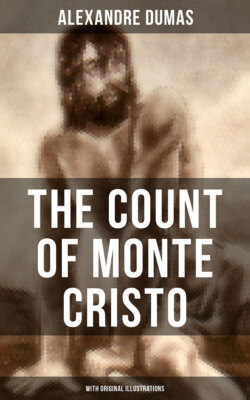Читать книгу The Count of Monte Cristo (With Original Illustrations) - Alexandre Dumas - Страница 127
На сайте Литреса книга снята с продажи.
Original
ОглавлениеSuch was the state of affairs when, the day after his interview with M. de Boville, the confidential clerk of the house of Thomson & French of Rome, presented himself at M. Morrel's. Emmanuel received him; this young man was alarmed by the appearance of every new face, for every new face might be that of a new creditor, come in anxiety to question the head of the house. The young man, wishing to spare his employer the pain of this interview, questioned the new-comer; but the stranger declared that he had nothing to say to M. Emmanuel, and that his business was with M. Morrel in person. Emmanuel sighed, and summoned Cocles. Cocles appeared, and the young man bade him conduct the stranger to M. Morrel's apartment. Cocles went first, and the stranger followed him. On the staircase they met a beautiful girl of sixteen or seventeen, who looked with anxiety at the stranger.
"M. Morrel is in his room, is he not, Mademoiselle Julie?" said the cashier.
"Yes; I think so, at least," said the young girl hesitatingly. "Go and see, Cocles, and if my father is there, announce this gentleman."
"It will be useless to announce me, mademoiselle," returned the Englishman. "M. Morrel does not know my name; this worthy gentleman has only to announce the confidential clerk of the house of Thomson & French of Rome, with whom your father does business."
The young girl turned pale and continued to descend, while the stranger and Cocles continued to mount the staircase. She entered the office where Emmanuel was, while Cocles, by the aid of a key he possessed, opened a door in the corner of a landing-place on the second staircase, conducted the stranger into an ante-chamber, opened a second door, which he closed behind him, and after having left the clerk of the house of Thomson & French alone, returned and signed to him that he could enter. The Englishman entered, and found Morrel seated at a table, turning over the formidable columns of his ledger, which contained the list of his liabilities. At the sight of the stranger, M. Morrel closed the ledger, arose, and offered a seat to the stranger; and when he had seen him seated, resumed his own chair. Fourteen years had changed the worthy merchant, who, in his thirty-sixth year at the opening of this history, was now in his fiftieth; his hair had turned white, time and sorrow had ploughed deep furrows on his brow, and his look, once so firm and penetrating, was now irresolute and wandering, as if he feared being forced to fix his attention on some particular thought or person. The Englishman looked at him with an air of curiosity, evidently mingled with interest. "Monsieur," said Morrel, whose uneasiness was increased by this examination, "you wish to speak to me?"
"Yes, monsieur; you are aware from whom I come?"
"The house of Thomson & French; at least, so my cashier tells me."
"He has told you rightly. The house of Thomson & French had 300,000 or 400,000 francs to pay this month in France; and, knowing your strict punctuality, have collected all the bills bearing your signature, and charged me as they became due to present them, and to employ the money otherwise." Morrel sighed deeply, and passed his hand over his forehead, which was covered with perspiration.
"So then, sir," said Morrel, "you hold bills of mine?"
"Yes, and for a considerable sum."
"What is the amount?" asked Morrel with a voice he strove to render firm.
"Here is," said the Englishman, taking a quantity of papers from his pocket, "an assignment of 200,000 francs to our house by M. de Boville, the inspector of prisons, to whom they are due. You acknowledge, of course, that you owe this sum to him?"
